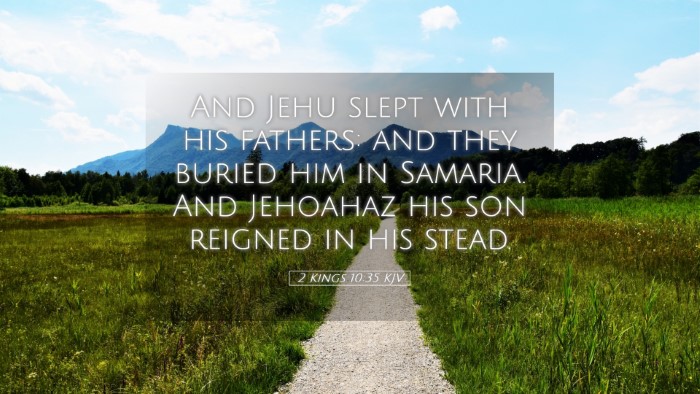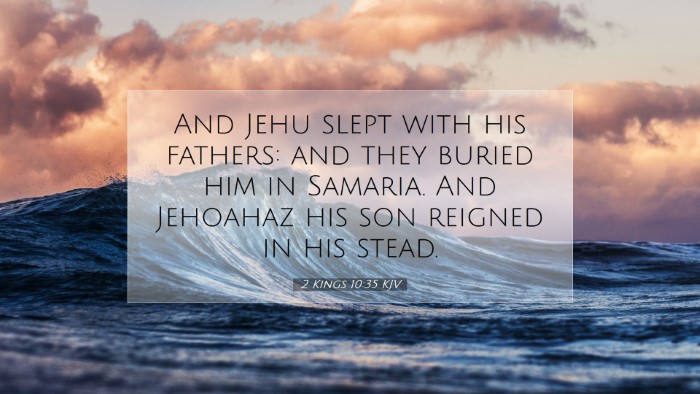Commentary on 2 Kings 10:35
Verse: "And Jehu slept with his fathers: and they buried him in Samaria. And Jehoahaz his son reigned in his stead."
Introduction
This verse serves as a concluding statement regarding the reign of Jehu, a significant figure in the history of Israel. The transition of power to Jehoahaz marks a pivotal moment in the ongoing narrative of the kings of Israel. The death of Jehu, a king noted for his righteous zeal against idolatry and the house of Ahab, allows scholars and theologians to examine the implications of his reign and the spiritual state of Israel at this juncture.
Historical Context
Jehu’s rise to power was characterized by violent purge against the house of Ahab and the worshippers of Baal. His reign, while marked by initial success (as seen in the overthrow of Ahab's lineage), ultimately met with challenges. The historical setting provides an essential backdrop for understanding the significance of his death and the succession of his son, Jehoahaz.
- Jehu's Accomplishments: Jehu was an instrument of divine judgment, fulfilling prophetic declarations concerning the house of Ahab.
- The Impact on Israel: Despite his zeal, Jehu’s tenure did not result in lasting reforms, as Israel continued in sins reminiscent of Jeroboam.
- The Transition to Jehoahaz: The mention of Jehoahaz illustrates a continuation of the dynastic line but raises questions about the spiritual condition of Israel.
Theological Reflections
This passage compels theological reflection on leadership, legacy, and divine judgment. Jehu, despite his credentials as a reformer, ultimately did not lead Israel to repentance.
- Legacy of Jehu: As a king, Jehu's actions had immediate effects, yet the long-term spiritual trajectory of Israel remained problematic, demonstrating that political reform alone is insufficient without a corresponding renewal of faith.
- Successor's Challenges: The reign of Jehoahaz reflects the daunting reality of continuing spiritual decline, hinting at generational issues regarding faithfulness to God.
- Divine Accountability: The ultimate accountability to God remains evident; kings are judged not merely on their rule but on their fidelity to Yahweh.
Commentary Insights
In examining the insights from prominent biblical commentaries:
Matthew Henry
Henry emphasizes that, "Jehu’s sleeping with his fathers signifies a complete end to his reign and a moment of reflection on his life and actions." He notes that Jehu’s death serves as a reminder of the temporality of earthly power and the ultimate sovereignty of God. Henry observes:
- Jehu's fierce commitment to God’s orders juxtaposed with the stark reality of unrepentant Israel.
- The compilation of the reigns of Israel's kings serves as both a historical account and spiritual lesson for future generations.
Albert Barnes
Barnes offers a historical viewpoint, asserting that Jehu's reign had “lasting consequences” on the kingdom of Israel. He argues that while Jehu acted decisively against idolatry, the deeper issues of corruption and spiritual neglect remained unaddressed. Key points include:
- Jehoahaz's character as shaped by the preceding generation's failures, indicating a cycle of moral decay.
- The significance of burial locations in understanding the heritage and honor of kings.
- Relating the narrative to God’s overarching plan for Israel amidst human failures.
Adam Clarke
Clarke highlights the implications of Jehu's demise, focusing on the challenges posed to Israel with Jehoahaz taking the throne. He stresses the necessity for immediate and drastic reforms. Clarke notes:
- Examples from Scripture where leadership transitions did not maintain fidelity to God’s commandments.
- The symbolism of "burial" relates to the legacy one leaves behind, both politically and spiritually.
- Warnings for later readers about the transient nature of power and the importance of seeking divine guidance in leadership.
Conclusion
2 Kings 10:35 encapsulates a moment of transition not merely in the line of kings but in the spiritual trajectory of Israel. Jehu's death is not just the end of an era but a challenge for Israel to heed the warning of God’s judgment and the importance of a renewed commitment to Him. As pastors, students, and scholars engage with this text, they are called to reflect on the implications of leadership, the significance of generational faithfulness, and the persistent need for repentance and revival within the community of faith.


